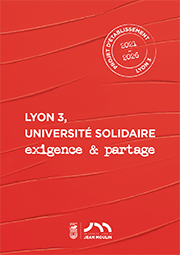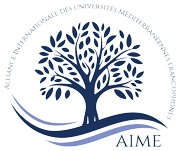AccueilRechercheProgrammes et productions scientifiquesThèsesThèses soutenuesThèses soutenues - 2006-2021Thèses soutenues - 2016
-
Partager cette page
- Recherche,
REICHE DE VIGAN Stéphanie
Le droit et l’espace souterrain Enjeux de propriété et de souveraineté en droit international et comparé.
Publié le 29 novembre 2016 – Mis à jour le 29 novembre 2016
Thèse en Droit mention Droit public soutenue le 18 octobre 2016.
L’espace souterrain, qui s’étend depuis la surface des terres émergées et des fonds marins jusqu’au centre de la Terre, est délaissé par le droit international. Aucune règle de droit international positif ne vient réglementer l’utilisation que les Etats font de leur espace souterrain territorial, cette utilisation et le régime de la propriété souterraine faisant partie de leur domaine réservé. Si les normes internationales régissent l’utilisation de l’espace souterrain extra-territorial, celui des grands fonds marins et celui de l’Antarctique, elles n’appréhendent l’espace souterrain qu’en termes d’utilisation et de mise en valeur des ressources minérales. De ce régime juridique d’exploration et d’exploitation des ressources minérales dépend d’ailleurs le statut juridique de l’espace souterrain qui va de la pleine souveraineté de l’Etat c?tier à l’exclusion de toute appropriation nationale ou individuelle. Devant la multiplication des utilisations souterraines et face aux dommages environnementaux et aux violations des droits de l’homme liés à certaines de ces utilisations, le droit international doit réinvestir l’espace souterrain et notamment le contenu et l’étendue des droits qui le concernent tant dans l’ordre interne qu’international afin d’en réglementer la mise en valeur et d’en assurer la protection.
Until today, there has been little interest of international Law concerning the earth’s subsurface, as the space that extends from the surface of the soil or of the seabed to the center of the earth. On the one hand, there is no rule of international law that regulates the use Sovereign States have of their territorial subsurface. It is currently understood that subsburface activities and property law that regulates them, are within domestic jurisdiction only and do not come under international law scrutinity as they waive the exercice of an absolute independance of States. On the other hand, the existing rules of international law that regulates extraterritorial subsurface, notably the seabed and ocean floor and subsoil thereof beyond national jurisdiction and the Antarctic, consider the earth’s subsurface mostly in terms of use and exploitation of mineral resources. Faced with the evergrowing uses of the subsurface that are solely used for extraction or for injection and storing, and regarding the impacts of some underground activities on the environment and on human rights, International Law must play a role by regulating the content and extent of rights that are exercised over the earth’s subsurface inside and outside territorial jurisdiction for development and protection purposes.
Mots-Clés : Appropriation – Changement climatique – Droit minier – Eaux souterraines – Environnement – Exploitation – Exploration – Fonds marins – Hydrocarbures non conventionnels – Industries extractives – Investissements – Mines – Peuples autochtones – Propriété – Ressources minérales – Ressources naturelles – Sous-sol – Souveraineté – Stockage géologique de CO2 – Territoire – Zones polaires.
Keywords : Appropriation – Carbon capture and storage – Climate change – Environment – Exploitation – Exploration – Extractive industries – Groundwater – Indigenous peoples – Investments – Minerals – Natural resources – Oil & Gas Law – Ownership – Polar regions – Property – Seabed – Sovereign rights – Sovereignty – Subsoil – Territory – Unconventional hydrocarbons.
Directeur de thèse : Philippe BILLET
Membres du jury :
- Philippe BILLET Professeur des universités Université Jean Moulin Lyon 3 Directeur de thèse
- Terence DAINTITH Professeur honoraire Université de Londres Président
- William DROSS Professeur des universités Université Jean Moulin Lyon 3 Examinateur
- Sandrine MALJEAN Directrice de recherche au CNRS Université d’Aix Marseille Pré-rapporteur
Président du jury : Terence DAINTITH
Equipe d'accueil : Equipe de droit public
Décision : AdmiseUntil today, there has been little interest of international Law concerning the earth’s subsurface, as the space that extends from the surface of the soil or of the seabed to the center of the earth. On the one hand, there is no rule of international law that regulates the use Sovereign States have of their territorial subsurface. It is currently understood that subsburface activities and property law that regulates them, are within domestic jurisdiction only and do not come under international law scrutinity as they waive the exercice of an absolute independance of States. On the other hand, the existing rules of international law that regulates extraterritorial subsurface, notably the seabed and ocean floor and subsoil thereof beyond national jurisdiction and the Antarctic, consider the earth’s subsurface mostly in terms of use and exploitation of mineral resources. Faced with the evergrowing uses of the subsurface that are solely used for extraction or for injection and storing, and regarding the impacts of some underground activities on the environment and on human rights, International Law must play a role by regulating the content and extent of rights that are exercised over the earth’s subsurface inside and outside territorial jurisdiction for development and protection purposes.
Mots-Clés : Appropriation – Changement climatique – Droit minier – Eaux souterraines – Environnement – Exploitation – Exploration – Fonds marins – Hydrocarbures non conventionnels – Industries extractives – Investissements – Mines – Peuples autochtones – Propriété – Ressources minérales – Ressources naturelles – Sous-sol – Souveraineté – Stockage géologique de CO2 – Territoire – Zones polaires.
Keywords : Appropriation – Carbon capture and storage – Climate change – Environment – Exploitation – Exploration – Extractive industries – Groundwater – Indigenous peoples – Investments – Minerals – Natural resources – Oil & Gas Law – Ownership – Polar regions – Property – Seabed – Sovereign rights – Sovereignty – Subsoil – Territory – Unconventional hydrocarbons.
Directeur de thèse : Philippe BILLET
Membres du jury :
- Philippe BILLET Professeur des universités Université Jean Moulin Lyon 3 Directeur de thèse
- Terence DAINTITH Professeur honoraire Université de Londres Président
- William DROSS Professeur des universités Université Jean Moulin Lyon 3 Examinateur
- Sandrine MALJEAN Directrice de recherche au CNRS Université d’Aix Marseille Pré-rapporteur
Président du jury : Terence DAINTITH
Equipe d'accueil : Equipe de droit public
Documentation
Mise à jour : 29 novembre 2016







